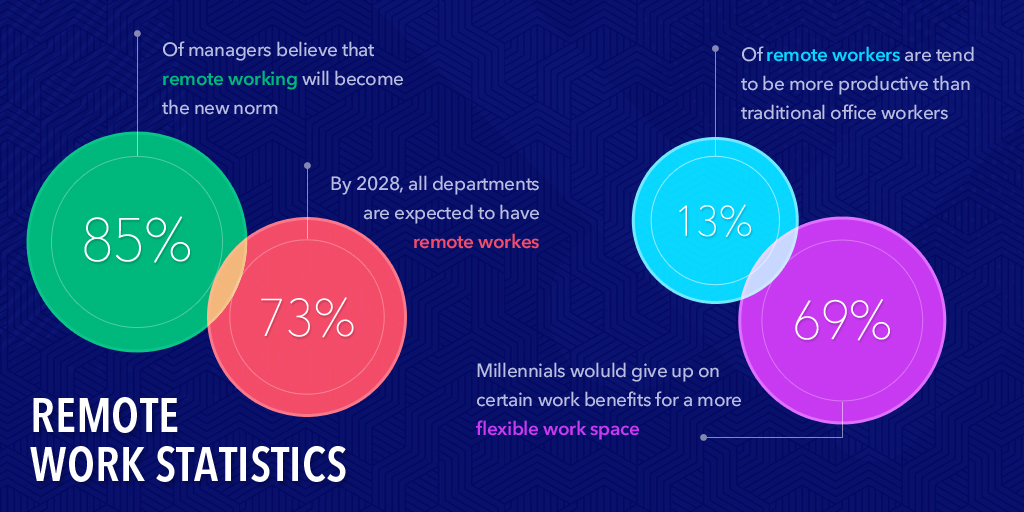Benefits of Working Remotely
Working remotely has become increasingly popular in recent years, offering numerous advantages for both employees and employers. In this article, we will explore the benefits of working remotely and how it can positively impact individuals and businesses.
Increased Flexibility
One of the key benefits of working remotely is the flexibility it provides. Remote work allows individuals to have better control over their schedules, enabling them to create a work-life balance that suits their needs. This flexibility allows employees to attend to personal matters, such as family commitments or personal appointments, without compromising their work responsibilities.
Improved Productivity
Contrary to popular belief, remote work often leads to increased productivity. Without the distractions of a traditional office environment, employees can focus better on their tasks and complete them more efficiently. Additionally, remote work eliminates the time-consuming commute, providing individuals with more time to dedicate to their work.
Cost Savings
Working remotely can result in significant cost savings for both employees and employers. Employees can save on commuting expenses, such as fuel costs or public transportation fees. Additionally, remote work eliminates the need for expensive office attire and meals purchased outside the home. From an employer’s perspective, remote work reduces overhead costs associated with maintaining a physical office space.
Increased Job Satisfaction
Remote work has been linked to higher levels of job satisfaction. Employees appreciate the autonomy and trust that comes with remote work arrangements, which can lead to a more positive work experience. Furthermore, remote work allows individuals to work in environments that are most conducive to their productivity and comfort, further enhancing job satisfaction.
Access to a Global Talent Pool
By embracing remote work, businesses gain access to a global talent pool. Rather than being limited to local candidates, companies can recruit and hire individuals from anywhere in the world. This expands the potential talent pool and allows businesses to tap into diverse skill sets and perspectives, ultimately driving innovation and growth.
Reduced Employee Turnover
Remote work has been shown to contribute to reduced employee turnover rates. Offering remote work options can be a valuable retention tool, as it provides employees with a desirable work-life balance and increased job satisfaction. When employees have the flexibility to work remotely, they are more likely to remain loyal to their employers.
Environmental Benefits
Working remotely has a positive impact on the environment. With fewer employees commuting to a physical office, there is a reduction in carbon emissions from transportation. Additionally, remote work reduces the need for office supplies and energy consumption, further minimizing the ecological footprint of businesses.

As technology continues to advance, remote work is becoming an increasingly viable option for individuals and businesses alike. The benefits of working remotely, including increased flexibility, improved productivity, cost savings, and access to a global talent pool, make it a compelling choice. Embracing remote work can lead to enhanced job satisfaction, reduced employee turnover, and positive environmental impact. Consider the advantages of remote work and explore how it can benefit your professional and personal life.
Frequently Asked Questions
1. What are the benefits of working remotely?
Working remotely offers several advantages such as increased flexibility, improved work-life balance, reduced commuting time, and the ability to work from anywhere.
2. How does remote work contribute to better work-life balance?
Remote work allows individuals to have more control over their schedules, enabling them to spend more time with family, pursue personal interests, and maintain a healthier work-life balance.
3. Can remote work increase productivity?
Yes, remote work has been shown to boost productivity. With fewer distractions and the ability to create a personalized work environment, employees often accomplish more in less time.
4. Are there cost savings associated with remote work?
Absolutely! Remote work can lead to significant cost savings for both employees and employers. Employees save money on commuting, work attire, and meals, while employers can reduce office space and related expenses.
5. How does remote work impact employee satisfaction?
Working remotely can enhance job satisfaction as it provides employees with more flexibility, autonomy, and a better work-life balance. This can lead to higher morale, job engagement, and overall happiness.
6. Does remote work improve employee retention?
Yes, remote work can contribute to higher employee retention rates. By offering this flexibility, companies can attract and retain top talent who value the benefits of remote work.
7. What types of jobs are suitable for remote work?
While not all jobs can be done remotely, many roles in fields such as software development, writing, customer service, marketing, and graphic design can be performed effectively from a remote location.
8. How can remote work enhance diversity and inclusion?
Remote work allows companies to hire talent from diverse backgrounds and geographical locations. This can lead to a more inclusive and diverse workforce, fostering creativity and innovation.
9. Are there any challenges associated with remote work?
Remote work may present challenges such as potential feelings of isolation, difficulty in separating work and personal life, and the need for strong communication and self-discipline. However, these challenges can be managed with proper strategies and support.
10. How can employers ensure effective communication in remote teams?
Employers can promote effective communication in remote teams by utilizing various tools and technologies such as video conferencing, instant messaging, project management software, and regular check-ins to maintain clear and open lines of communication.




